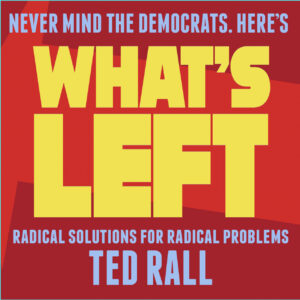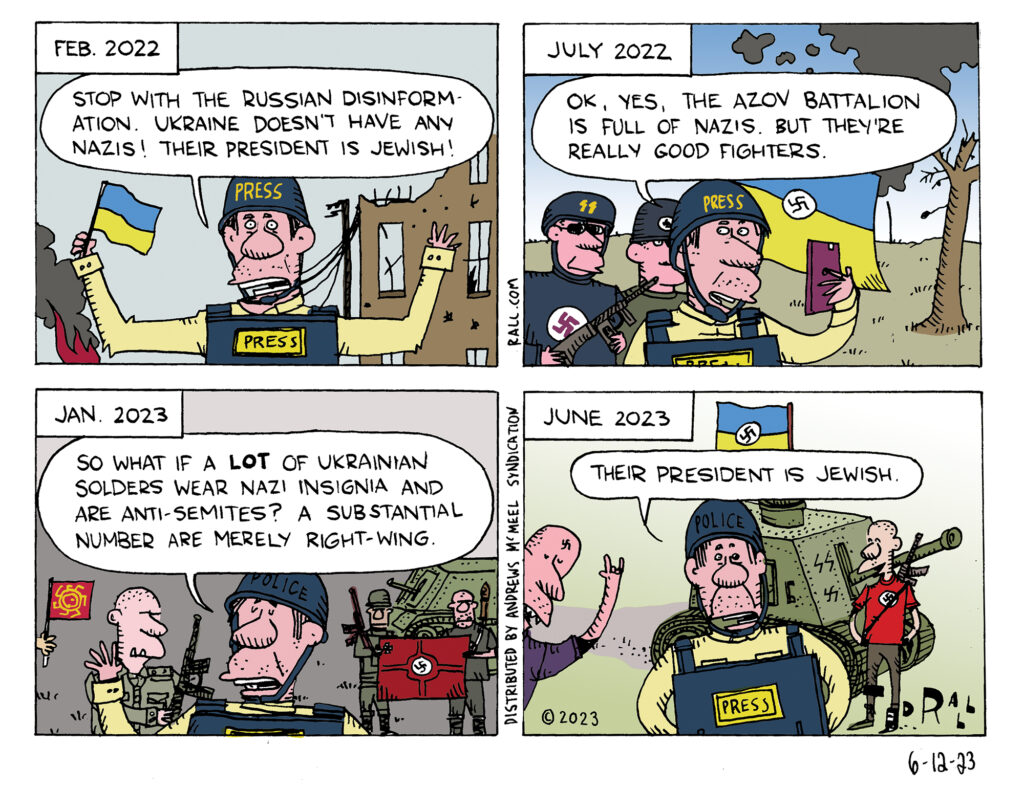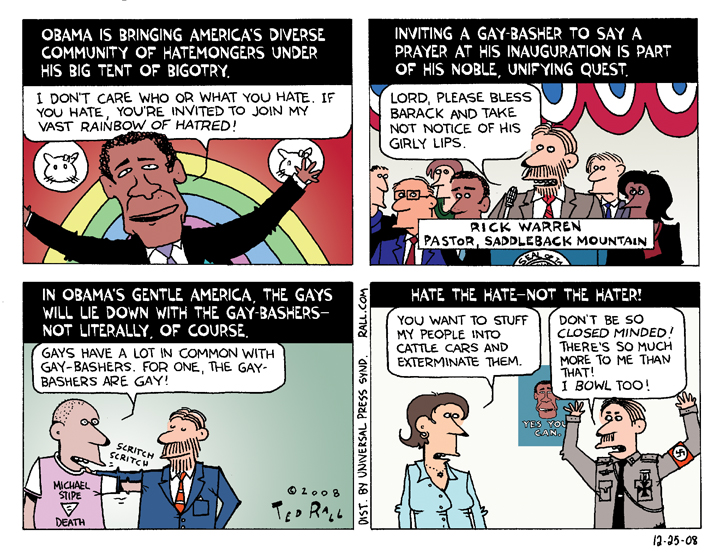Anti-Semitism as we know it has resulted from a complex witch’s brew of historical stereotypes, economic resentments, ignorance and political extremism. Anti-Semites believe that Jewish people “have too much power,” “have too much control and influence,” and “are more willing than others to use shady practices to get what they want.”
A central, paranoid canard of anti-Semitism is that Jews secretly manipulate the media, business, politics, academia and other institutions via a shadowy cabal. Rational people know this is not and cannot be true. One in five Jewish households in the U.S. is either poor or near-poor, meaning they cannot make ends meet or are barely managing to do so. If practitioners of their 4,000-year-old religion is dedicated to conniving and getting rich, they’re doing a lousy job.
Anti-Semitism is poisonous and stupid. Yet, after decades of subsiding, it appears to be spreading again. Zionism is a contributing factor to the recent increase—or, more specifically, the tactics being deployed by some Zionists to stifle their political opponents.
Supporters of Israel have long argued that criticism of the Jewish state and/or the policies of its government is tantamount to anti-Semitism. Since many of the most strident enemies of Zionism are ultra-religious Jews and many of the most passionate opponents of Israel and its treatment of the Palestinians are Jewish, this too is not and cannot be true. After Hamas broke through the Gaza-Israel Barrier and attacked Israelis on October 7, 2023, Americans who back Israel have come closer than ever before to institutionalizing a presumed equivalence between anti-Zionism and anti-Semitism. The House of Representatives overwhelmingly declared the two to be one and the same in a bipartisan resolution, the once-staid Anti-Defamation League began counting reports of anti-Israel speech as anti-Semitic incidents, and Ivy League colleges like Columbia and Harvard adopted disciplinary codes that ban speech against Israel, including protest demonstrations.
Criticizing Israel has long been fraught. Now, it’s more dangerous than ever. You can be doxxed, fired, blacklisted, suspended, expelled, stripped of your college degree, arrested, overcharged with felonies, or disappeared and deprived of medical care to the point of imperiling your life. You can even have your application for citizenship summarily denied or be deported.
If the idea is to make people afraid of speaking their minds, these strongarm tactics are working—discussion of the Israel-Palestinian conflict and the Middle East has all but vanished from campuses and workplaces. Zionists and their Trump Administration allies don’t seem to mind. They say they’re fighting anti-Semitism, a goal all decent people agree with.
One wonders if they’ve considered the consequences of their aggressive approach, which brooks no dissent or criticism—and operates ruthlessly behind the scenes to get people. When you violate the privacy of and endanger passionate young antiwar protesters, and you derail their educations, and you pull strings at the White House to get them violently deported, will they start supporting Israel? It’s far likelier that they, their friends and family members, and those who read about what happened to them, will conclude that Zionists are vicious, disgusting people—that they “have too much control and influence.” Since Zionists have conflated their loyalty to a country with the practice of a religion, some may start to resent Jewish people as well.
Let’s say you’re one of the 30% of American voters who already believe Jews control the media. Supporters of Israel are working overtime to confirm your bigotry.
News coverage of Israel’s war in Gaza spills nearly as much ink on the few hundred hostages seized by Hamas as the few hundreds of thousands of Gazans killed by Israel. Few Democratic or Republican politicians are willing to criticize Israel, much less call for severing military and diplomatic relations to force Israel to stop its war—because they’re both afraid of AIPAC, the pro-Israel lobbying group. That, obviously, is influence.
Or, let’s say you think American Jews are like the man behind the curtain in The Wizard of Oz, pulling strings to get their way. Then you read how Angelica Berrie, a wealthy donor to Columbia, lit up her private direct line to that university’s president for months, threatening to withhold future payments unless the school provided “evidence that you and leaders across the university are taking appropriate steps to create a tolerant and secure environment for Jewish members of the Columbia community.” Yet when you scour the Internet for evidence that Jewish students at Columbia have suffered intolerance, there’s little there there. Instead, the university has banned Jewish groups that support Palestine, suspended and expelled their members, had them arrested and roughed up by the cops, and when that wasn’t enough for the donors, they got the president fired too, and convinced Trump to cancel hundreds of millions in federal research grants.
Even after all that, Columbia didn’t issue a peep of protest when one of its recent master’s degree graduates, Mahmoud Khalil, was dragged off into the night by unidentified goons in an unmarked car in front of his eight-month-pregnant wife and dumped in a private Louisiana prison, where he remains. His crime, according to Trump: peacefully protesting Israel’s war against the people of Gaza. Tufts student Rümeysa Öztürk, currently out on bail, was similarly kidnapped off the street; her offense, according to the authorities, was co-authoring an op-ed in the student newspaper asking Tufts to support the Palestinians. The president and his secretary of state say these and other recent roundups are just the beginning, and that anyone who criticizes Israel risks deportation and similar abuse at the hands of the U.S. government.
Whatever one’s opinions on Israel, it’s impossible to deny that this tiny country the size of the state of New Jersey, with no natural resources to speak of, enjoys unique lèse-majesté status—a special don’t-go-there zone that has become even more ferociously defended under Trump. France is a close U.S. ally, yet Americans can say anything you want about it or its president, Emmanuel Macron. If you’re a green-card holder or attending an American college on a student visa, you need not fear deportation for insulting Eritrea on social media, or protesting Brazil on campus, or penning an op-ed about the rascals who govern South Korea.
The right-wing crackdown on anti-Israel commentary orchestrated by Zionists and their MAGA allies of convenience did not evolve organically, resulting from a vigorous and open exchange of views in a free society. There has been no buy-in, nor any effort by individuals and organizations who support Israel to reach out to people with moderate views, much less those who believe Israel is waging genocide and ethnic cleansing against the Palestinians. There has only been bullying. If you dare speak out against Israel, sinister forces, that you may or may not ever be able to identify, will declare you an anti-Semite and crush you.
Which might prompt you to conclude that you’d been the victim of people who “use shady practices to get what they want.”
For the time being, Zionist bullying will continue to be effective. But it cannot and will not seduce any hearts and minds into seeing things from Israel’s perspective. To the contrary, support for Israel in the United States has plunged to a 25-year low over the last two years. It will keep dropping. If you’re truly worried about anti-Semitism, and you ruin people’s lives for expressing anti-Zionist thoughts while you equate anti-Zionism with anti-Semitism, you will not only turn Americans against Israel, you will turn them against Jews. Some of your victims—and those who care about them—will become vulnerable to the toxin of actual anti-Semitism.
(Ted Rall, the political cartoonist, columnist and graphic novelist, is the author of “Never Mind the Democrats. Here’s WHAT’S LEFT.” Subscribe: tedrall.Substack.com.)
 What IS the Left? What should we fight for? How can we rebuild outside of the Democrats? Order my latest book “WHAT’S LEFT” here at Rall.com. It comes autographed to the person of your choice, and I’ll deliver it anywhere. Cost including shipping is $29.95 in the USA.
What IS the Left? What should we fight for? How can we rebuild outside of the Democrats? Order my latest book “WHAT’S LEFT” here at Rall.com. It comes autographed to the person of your choice, and I’ll deliver it anywhere. Cost including shipping is $29.95 in the USA.



